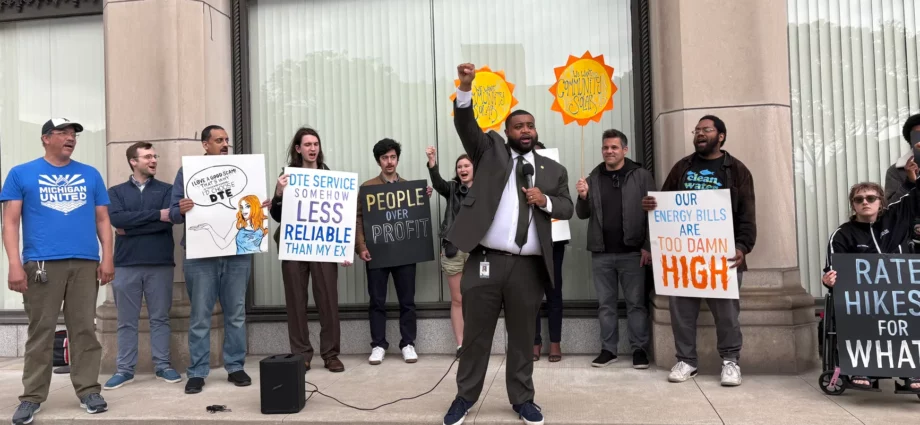As DTE Energy seeks a $574 million rate increase, residents and legislators call for transparency, accountability, and affordability in Michigan’s energy policy.
Detroit, MI — A new rate hike proposal from DTE Energy has ignited widespread outrage across Michigan, with State Rep. Donavan McKinney warning that “another rate hike will literally bankrupt families.” The proposed $574 million increase—the utility’s fourth in just five years—would raise monthly residential bills by $13.50, intensifying financial pressure on low-income communities already struggling to keep the lights on.
On Thursday, May 29, hundreds of protestors gathered outside Cadillac Place in Detroit, where the Michigan Public Service Commission (MPSC) held a town hall meeting. The rally, organized by advocacy groups like Clean Water Action, Detroit Action, Michigan United, and Voters Not Politicians, drew residents, activists, and lawmakers united under a common demand: Put people before profits.
DTE’s Proposal: A $13.50 Monthly Hike Amid Growing Costs
DTE’s latest proposal, if approved, would more than double the utility’s previously approved rate increase. This would bring the average household’s monthly bill to nearly $150, a cost many residents say they simply cannot afford.
“We’re forced to choose between electricity and groceries,” said Roslyn Ogburn, a lifelong Detroiter and partnership coordinator at the Michigan League of Conservation Voters. “These rate hikes are choking our people.”
Ogburn emphasized that DTE’s focus appears to be on delivering shareholder profits, not essential services. “Utility companies aren’t putting people first—they’re putting profit first,” she said.
Protesters Demand Change, Call for Oversight and Transparency
Chanting “Enough is enough!” and “We will take back our power!,” the protestors demanded a full rejection of DTE’s proposal. Signs reading “Rate hikes? For what?” and “Our energy bills are too damn high” captured the mood of the crowd.
Inside the MPSC meeting, attendees were split into small discussion groups to voice concerns directly to commissioners Dan Scripps, Katherine Peretick, and Alessandra Carreon, along with representatives from the Attorney General’s office and the Utility Consumer Participation Board.
Key demands included:
-
Monthly public reporting of complaints and their resolutions
-
Clearer communication of commission decisions
-
More accessible public input processes
State Legislators Join the Fight Against Rate Increases
State lawmakers have echoed public frustration. Rep. Dylan Wegela (D-Garden City) recently introduced Bills 5520 and 5521, which aim to prohibit political donations from state-regulated utilities and affiliated nonprofits—an attempt to curb corporate influence on energy policy.
“They’re drowning out the voice of the people,” said Eric Shelley of Michigan United. “We want the Legislature to stop taking DTE money.”
Rep. Donavan McKinney (D-Detroit), who represents Michigan’s poorest district, delivered a passionate speech at the rally.
“The median income in my district is just $14,000,” McKinney said. “Another rate hike will literally bankrupt families that are already playing catch-up.”
He noted that over 1,000 households were without power in his district on the day of the rally.
Why Are Utilities Requesting Hikes So Frequently?
Under current rules, utilities can request rate hikes every year. In early 2025, the MPSC approved only partial increases: DTE received $217.4 million of a requested $456.4 million, while Consumers Energy was granted $153.8 million out of $325 million.
MPSC Chair Dan Scripps defended the process, stating utilities must justify every expense. “When utilities file a new case, it means their current rates aren’t covering their system investments,” he said.
Audit Reveals Aged Infrastructure and Delays in Power Restoration
A 2024 third-party audit commissioned by the MPSC painted a bleak picture of Michigan’s utility infrastructure. Among the findings:
-
DTE averaged 3.5 days to restore power after major storms
-
Tree trimming covered only 70% of recommended areas
-
58% of DTE’s power poles were over 40 years old
The report criticized both DTE and Consumers Energy for favoring high-return capital projects over basic maintenance. Attorney General Dana Nessel and others say this “profit-first” approach is directly responsible for poor service reliability.
Public Trust in Regulatory Bodies Is Waning
Many protestors expressed skepticism about the MPSC’s relationship with the utilities it regulates.
“We feel like the utility companies are in bed with the MPSC,” said Ogburn. She also called out DTE’s lack of investment in renewable energy and sustainability.
In response, Scripps highlighted the state’s efforts to phase out coal, expand solar and wind energy, and promote energy efficiency, claiming these efforts have shielded consumers from even higher long-term costs.
Yet, for many residents, the frustration lies in the here and now.
“They ask for more and more money, but our service gets worse and worse,” said Shelley. “And we still pay the highest energy rates in the Midwest.”
Looking Ahead: Can Equity and Infrastructure Coexist?
The growing backlash over DTE’s rate hike request underscores a central tension: How can Michigan balance the need for utility infrastructure investment with the economic realities of its most vulnerable residents?
As public scrutiny mounts, the MPSC faces pressure not just to regulate, but to reform—to prioritize affordability, enforce accountability, and rebuild trust in the state’s energy system.
